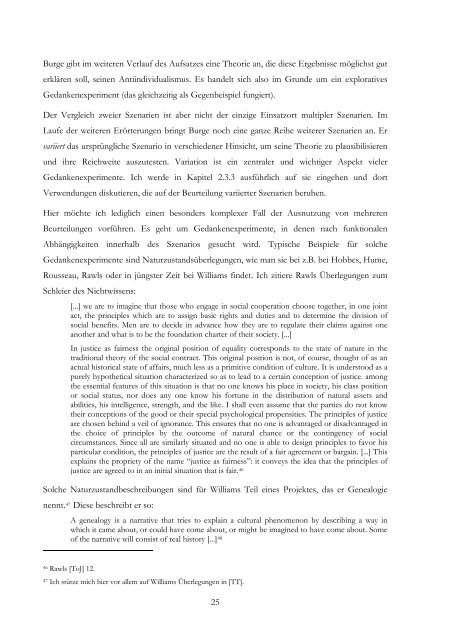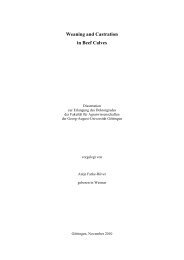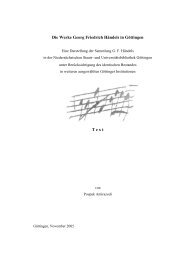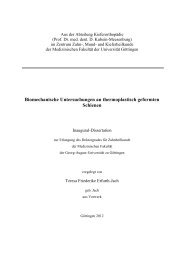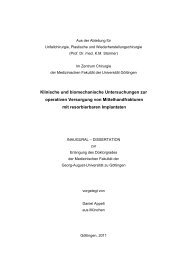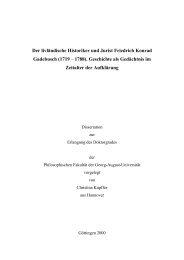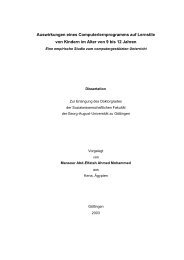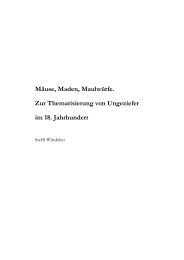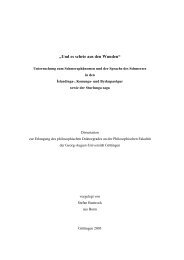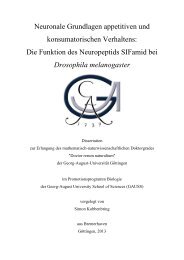Gedankenexperimente Eine Familie philosophischer Verfahren
Gedankenexperimente Eine Familie philosophischer Verfahren
Gedankenexperimente Eine Familie philosophischer Verfahren
Erfolgreiche ePaper selbst erstellen
Machen Sie aus Ihren PDF Publikationen ein blätterbares Flipbook mit unserer einzigartigen Google optimierten e-Paper Software.
Burge gibt im weiteren Verlauf des Aufsatzes eine Theorie an, die diese Ergebnisse möglichst gut<br />
erklären soll, seinen Antiindividualismus. Es handelt sich also im Grunde um ein exploratives<br />
Gedankenexperiment (das gleichzeitig als Gegenbeispiel fungiert).<br />
Der Vergleich zweier Szenarien ist aber nicht der einzige Einsatzort multipler Szenarien. Im<br />
Laufe der weiteren Erörterungen bringt Burge noch eine ganze Reihe weiterer Szenarien an. Er<br />
variiert das ursprüngliche Szenario in verschiedener Hinsicht, um seine Theorie zu plausibilisieren<br />
und ihre Reichweite auszutesten. Variation ist ein zentraler und wichtiger Aspekt vieler<br />
<strong>Gedankenexperimente</strong>. Ich werde in Kapitel 2.3.3 ausführlich auf sie eingehen und dort<br />
Verwendungen diskutieren, die auf der Beurteilung variierter Szenarien beruhen.<br />
Hier möchte ich lediglich einen besonders komplexer Fall der Ausnutzung von mehreren<br />
Beurteilungen vorführen. Es geht um <strong>Gedankenexperimente</strong>, in denen nach funktionalen<br />
Abhängigkeiten innerhalb des Szenarios gesucht wird. Typische Beispiele für solche<br />
<strong>Gedankenexperimente</strong> sind Naturzustandsüberlegungen, wie man sie bei z.B. bei Hobbes, Hume,<br />
Rousseau, Rawls oder in jüngster Zeit bei Williams findet. Ich zitiere Rawls Überlegungen zum<br />
Schleier des Nichtwissens:<br />
[...] we are to imagine that those who engage in social cooperation choose together, in one joint<br />
act, the principles which are to assign basic rights and duties and to determine the division of<br />
social benefits. Men are to decide in advance how they are to regulate their claims against one<br />
another and what is to be the foundation charter of their society. [...]<br />
In justice as fairness the original position of equality corresponds to the state of nature in the<br />
traditional theory of the social contract. This original position is not, of course, thought of as an<br />
actual historical state of affairs, much less as a primitive condition of culture. It is understood as a<br />
purely hypothetical situation characterized so as to lead to a certain conception of justice. among<br />
the essential features of this situation is that no one knows his place in society, his class position<br />
or social status, nor does any one know his fortune in the distribution of natural assets and<br />
abilities, his intelligence, strength, and the like. I shall even assume that the parties do not know<br />
their conceptions of the good or their special psychological propensities. The principles of justice<br />
are chosen behind a veil of ignorance. This ensures that no one is advantaged or disadvantaged in<br />
the choice of principles by the outcome of natural chance or the contingency of social<br />
circumstances. Since all are similarly situated and no one is able to design principles to favor his<br />
particular condition, the principles of justice are the result of a fair agreement or bargain. [...] This<br />
explains the propriety of the name “justice as fairness”: it conveys the idea that the principles of<br />
justice are agreed to in an initial situation that is fair. 46<br />
Solche Naturzustandbeschreibungen sind für Williams Teil eines Projektes, das er Genealogie<br />
nennt. 47 Diese beschreibt er so:<br />
A genealogy is a narrative that tries to explain a cultural phenomenon by describing a way in<br />
which it came about, or could have come about, or might be imagined to have come about. Some<br />
of the narrative will consist of real history [...] 48<br />
46 Rawls [ToJ] 12.<br />
47 Ich stütze mich hier vor allem auf Williams Überlegungen in [TT].<br />
25


